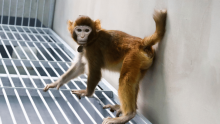Cloning
Genes of endemic species in Tuz Lake to provide agricultural sustainability
In a groundbreaking initiative, genes extracted from endemic plant species native to Tuz Lake region, which supplies the majority of the country's salt, will be harnessed to combat drought and enhance agricultural sustainability.
This will be accomplished by passing these genes on to plants that can withstand drought, such as wheat, rye, barley, clover and other similar species.
Scientists clone first rhesus monkey using new method
Scientists in China on Jan. 16 announced that they have cloned the first healthy rhesus monkey, a two-year-old named Retro, by tweaking the process that created Dolly the sheep.
Primates have proved particularly difficult to clone, and the scientists overcame years of failure by replacing the cloned cells that would become the placenta with those from a normal embryo.
MİT nabs man who cloned Erdoğan’s voice with AI for fraud
The National Intelligence Organization (MİT) has caught an individual attempting to defraud businesspeople and high-level public officials by mimicking President Recep Tayyip Erdoğan's voice using artificial intelligence.
Probe into fake doctor accused of duping patients
A case file against a 65-year-old physiotherapist who claimed to be a neurologist and deceived 15 multiple sclerosis patients has been submitted to an investigating judge, while his identity will be publicized shortly as it is thought the number of his victims is significantly higher.
- Read more about Probe into fake doctor accused of duping patients
- Log in to post comments
Six plants with high economic return cloned
In the Tissue Culture Laboratory established in the northern province of Ordu, six plants that were difficult to access have been cloned, yielding 40,000 saplings.
Tissue samples are taken from plants with high economic yield, and tissue fragments are sterilized.
- Read more about Six plants with high economic return cloned
- Log in to post comments
High-flying experiment: Do stem cells grow better in space?
The experiment is the latest research project that involves shooting stem cells into space…
What happened to Dolly the cloned sheep?
She was genetically identical to the sheep from whom the mammary cell was taken
- Read more about What happened to Dolly the cloned sheep?
- Log in to post comments
World’s largest plant is a vast seagrass meadow in Australia
Scientists have discovered the world's largest plant off the Australia coast _ a seagrass meadow that has grown by repeatedly cloning itself.
Genetic analysis has revealed that the underwater fields of waving green seagrass are a single organism covering 180 square kilometers through making copies of itself over 4,500 years.
Baby abandoned in Thessaloniki
A newborn boy, who was found abandoned at the entrance of a Thessaloniki apartment block on Tuesday, was later being treated at the northern port city's Ippokrateio Hospital, along with the infant's 24-year-old mother who was traced to a nearby apartment.
- Read more about Baby abandoned in Thessaloniki
- Log in to post comments
Turkey: Home of stem cell hope for ailing refugees
Turkey has been providing cutting-edge, free-of-cost stem cell treatment to otherwise dying refugees and underprivileged people at a time when most countries do not even allow them to cross their borders.
- Read more about Turkey: Home of stem cell hope for ailing refugees
- Log in to post comments








